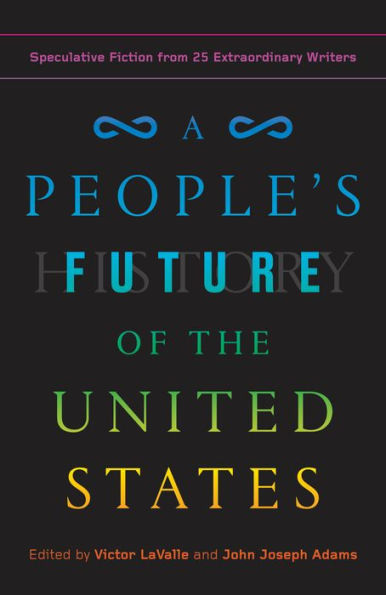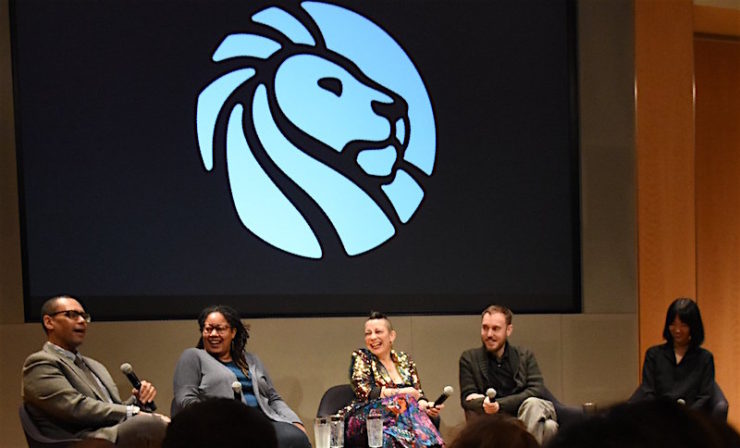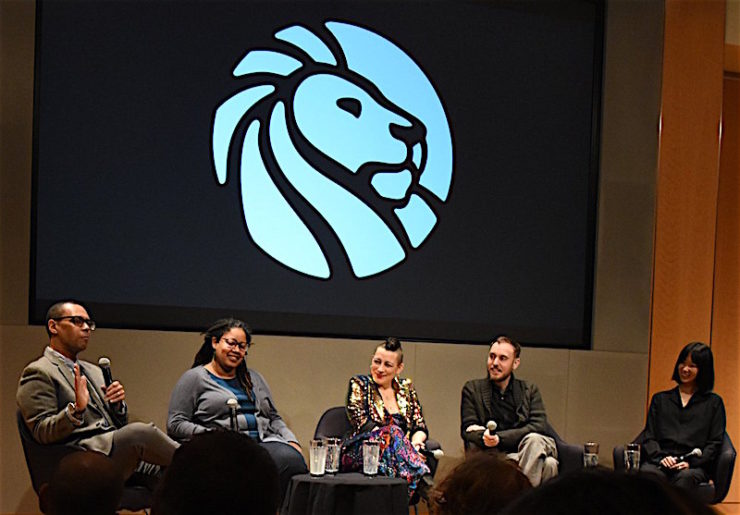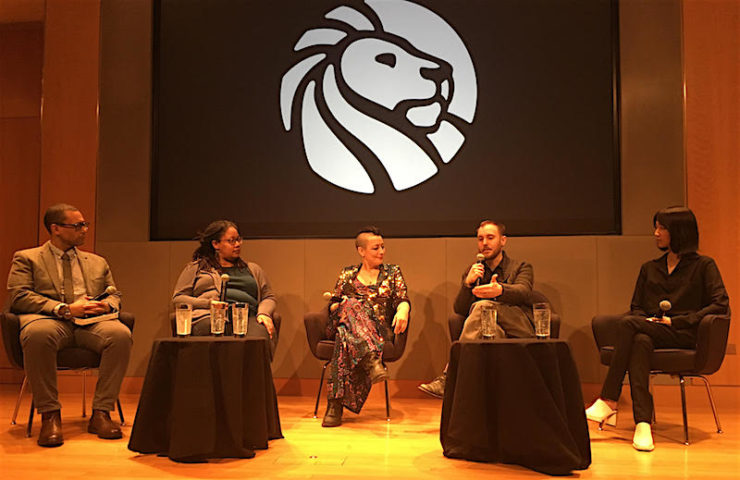A vibrant new anthology from editors Victor LaValle and John Joseph Adams, A People’s Future of the United States (a riff on Howard Zinn’s classic work of corrective scholarship, A People’s History of the United States) features some of the most exciting SFF authors writing today telling stories of resistance “that would challenge oppressive American myths, release us from the chokehold of our history, and give us new futures to believe in.”
Most of the stories in the anthology take place after a catastrophic event, and most track the struggles of marginalized people who are under even greater threat than usual. In celebration of the book’s launch, the New York Public Library hosted a rousing conversation between LaValle and four of his contributors: N.K. Jemisin, Maria Dahvana Headley, Sam J. Miller, and Alice Sola Kim. I’ve gathered up some of the highlights of the evening.
On Finding Hope in a Hopeless Situation
Victor LaValle notes that many of the stories in the anthology deal with violence—sometimes physical, sometimes emotional—and yet the characters “did seem hopeful in a way, or at least…not destroyed.” He asked how the authors balanced between hope and hopelessness in their work.
While acknowledging the bleakness of both real life and fiction, Maria Dahvana Headley stressed finding joy for her story “Read After Burning”: “I’m a person who also believes in the possibility of love and joy and grit to transform things—I’m a believer in that, I think that changes the world. So I wanted to write about that as well, and it caused me to write a long history, I wrote several generations past the collapse, I thought, “OK, what happens when everything goes wrong? And then you live through it? And there are children? And they live through it? And now you have grandchildren who weren’t around for the collapse? And now this is the world and the world still has bright and beautiful things in it.”
Buy the Book


A People’s Future of the United States: Speculative Fiction from 25 Extraordinary Writers
N.K. Jemisin noted that in watching the events of the last few years, and “the world turning into this place that for some people it actually has been all along, places that our country in particular was, not too long ago, for my parents’ generation” that she needed to confront the rhetoric and violence. “It felt honest to engage with the bleakness of it. By talking about death. But I think that’s the thing that all of us may have engaged with, is that you’re working on this incredibly bleak material, but people survive that. And that, in and of itself, is a story of hope. Generations after a collapse, well, you’ve just got a different world now. That’s what we’ve all got to deal with, and we’ve all got to address.” In Jemisin’s case, she reached toward the ridiculous to make sense of a terrible future in her story, “Give Me Cornbread of Give Me Death”—“I decided to write about dragons and collard greens, cause…the absurdism let me laugh at this terrifying notion of people mass-forced into camps…at the end of the day they all sit down and have a good meal that’s what life under this kind of situation is like.”
Alice Sola Kim, who tackled a fantastical version of the #MeToo movement in her story, “Now Wait for This Week,” talked about the necessity of fantasy: “In my story, I thought the only way I can imagine, someone coming to terms and facing what they did admitting it, and apologizing is if they’re forced to by dark magic. It’s sort of wish fulfillment, but it’s also…I still can’t believe it can really happen, which is pessimistic of me. Where I locate the hope in the story is among the friends who are dealing with this stuff…nothing is perfect, even resistance isn’t perfect, but even talking about it, and naming it, is hopeful.”
“It’s also one of the funniest things I’ve ever read!” Sam J. Miller added, before talking a bit about his story “It Was Saturday Night, I Guess That Makes It All Right” and saying that he constantly swings between “ecstatic joy” and “profound despair” which leads to his fiction “trying to come to terms with how the world can be both so fucked up and so full of wonderful things how people can do such horrible things and participate, often unwittingly, in such horrible systems, but also do wonderful things as well. I don’t know why that became a story of a future where Prince is illegal and Big Brother Is Listening…but that’s what happened.”
On Childhood Inspiration

LaValle asked how the writers were shaped as young readers, and spoke of his own love of D’Aulaires’ Book of Greek Myths “they were really grotesque and disturbing, and when I was 6 or 7—I was drawn to like a guy with eyes all over his body, and then you find out he gets them all stabbed out, I particularly liked those…”
Jemisin: “Greek mythology is not particularly nice.”
LaValle: “…and then from there I moved to Norse mythology…”
Jemisin: “Also not nice.”
LaValle: “I found something beautiful about how often the humans beings fought the gods. How often they refused the whims of the gods. Even when it destroyed them.”
Jemisin added, “I read mythology, I also—Prometheus’ liver! Oh my god!—you know, and as I got older, and I started studying mythology, as I explored the mythologies of people around the world I realized what drew me to stories of gods as fallible and sometimes even monstrous or evil beings, was just the core of the story was, bad things happen but you’ll survive…you might even manage to kill the god that’s been dogging your family for years and years. Or if you’re a trickster and you’re careful about what you do, you can change the whole paradigm of how the world works—and sometimes pay a horrible price for that. It seemed more true to what I needed to understand about the world…I grew up Southern Black Baptist, and I wasn’t get messages that helped me get through from that, I was getting messages that helped me get through from Prometheus’ liver.”
Headley told us that her story in the anthology featured ‘The Library of the Low’ a “library of the untold narratives, revisions, translations, elisions, that are being rewritten by this librarian who’s like, “Fuck the canon—the canon has led us here [the post-collapse world of her story] and “my Library of the Low is full of what I read as a kid: Ursula Major, who’s of course Ursula Le Guin, Octavia the Empress, who is of course Octavia Butler.” She spoke of being especially interested in “texts that imply the survival of their authors, the idea that this person told more than one story, and lived to tell the tale. Not just women of course—I’m interested in all the people who you wouldn’t expect to live through some of the events of our history, you wouldn’t expect them to be able to write their stories down, to have their words read, the idea that there have been so many survivors who have managed to tell their stories is for me, what keeps me going, and keeps me writing.”
Sam Miller turned to James Baldwin and Jean Genet for inspiration. “One of the sites of resistance coming of age as a young queer person was sex. And finding a text that was telling a story of a kind of desire that I wasn’t seeing anywhere else, that validated what I was feeling and who I was-that can be really radical. It can be about survival. Being a queer person, reading James Baldwin thinking about being an out, gay man at a time when you could—not that you can’t still be murdered for it, or attacked—but thinking about the courage it took to live, and to be who you were, and have sex with who you wanted to have sex with. It’s not that different than the courage of the mortals who defied the gods, and said, ‘I’m going to do this thing, even though I’m pretty sure it’s gonna get me killed, because not doing it would make my life unlivable.’” Genet particularly helped him think about societal structures: “How does the world function on some people being oppressed, marginalized, and fucked over?”
Alice Sola Kim cited her love of horror, particularly works like Stephen King’s that were “vivid and deeply unwholesome.” She also loved the anthologies of Helen Hoke: “those were formative, they were in the library, and they had these…not disgusting, but really horrifying covers, you’d just stare at them and kind of fall into them…there’d be this horror, or thing that was after you, it was made for you somehow, it wants you, specifically, which is part of the awfulness of it—like a lock and key. And I feel like that’s applicable to life in the sense that there are all these horrors that depending on who you are, or what group you belong to, there are people, institutions, ideas, that after you because of who you are. And you don’t always survive—you often don’t—but sometimes you do.”
On Fighting the Good-but-Hopeless Fight

And given that this is an anthology about societies in a state of collapse, upheaval, or utter destruction, LaValle had to ask the bleakest question of all: “How do you wrestle with a thing you just. Can’t. Defeat? In your work in general, can you imagine a story where life is…solved?”
Miller stressed the importance of the downer ending. “This comes down to a happy ending in a story, and they often feel profoundly dishonest. Even when I write a happy ending I want to qualify it somehow, I want to have some horrific thing that happens. You don’t get away clean—if you do then what was the point of all this?” He did qualify his answer after a moment, adding to laughter that, “…as a storyteller, I don’t think it’s good practice, as a person I’d like to think that it’s possible.”
Headley shared an event from her youth that shaped her thinking on endings in a profound way: When I was a teenager I had a near death experience, and everything changed and nothing changed—I went back to school, and I was in 9th grade, and I thought everything was different, and everyone thought I was the same person. And I was like, “But now I know what it’s like to die…and now I know that lots of these things don’t matter!” But everything still mattered. And so in my work I’m constantly battling with the idea that anything is ever what it looks like, that anything is simple…to come back from dying, and kind of horribly, to come back to being a person who can walk around looking unscathed? It’s informed my entire career, informed all of my understanding of story, across history. I think it’s all that, it’s all what do you do with your last day? Cause every day is your last day. It’s all the same stakes, really. Can you change the world at all? The great joy of life is that you can change the world a lot.”
Jemisin also looked to her youth for her ideas of endings—and more importantly her ideas of futures beyond the ending. “…my parents would give me all this stuff about surviving slavery, and Harriet Tubman was my hero when I was growing up, all these people who talked about how much we’ve been through and how much we survived. Which was useful. But what I was desperate for was—where are we in the future? Did something happen? Is something going to happen? Because of course I’m reading all these science fiction stories and novels by the golden age greats, and if there’s a Black person in them they very quickly say ‘well, it doesn’t matter anymore that I’m Black…I just mention it for, uh, for no reason.’ Or, they get killed, or something happens to them and then you realize that they’re the only one. They’re the only one in that future. We’re going forth, we’re meeting aliens, but the humans are all white dudes. What the hell? What I was craving was our future. Where are we in the future? This is the way in which I sought optimism: the future might not be great, but we’ll be there.”
And Kim agreed with her particular type of deadpan grit in the face of terrible historical moments, both real and fictional: “I’m a Gloomy Gus as a writer–not like I’m an edgelord that’s all ‘CHAOS REIGNS!’ but I do feel like, after my contamination with horror fiction at a young age, I’m interested in writing about what happens after the bad stuff happens or during the bad stuff happening, I just think life is full of the things you like and want, and the things you don’t like and don’t want. The hope is located in dealing with it, somehow, living through it, somehow. Having a story to tell, or having it told about you, is something.”
Leah Schnelbach is weirdly less afraid of the future if one of these authors is writing it? Come scream “CHAOS REIGNS!” with her on Twitter!










